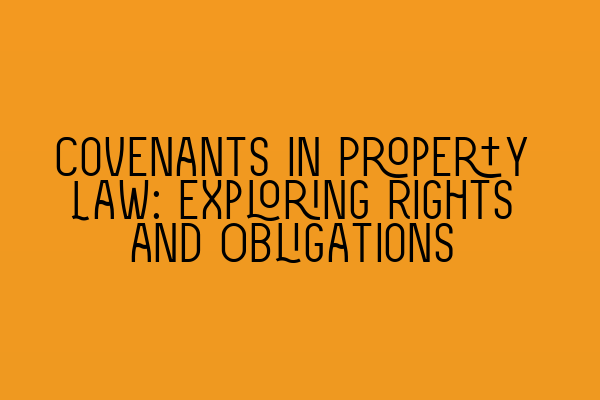Title: Covenants in Property Law: Exploring Rights and Obligations
Introduction:
Welcome to the SQE Property Law & Land Law blog, where we delve into the intricacies of property law. In this article, we will discuss covenants in property law, their significance, and the rights and obligations they entail. Whether you are a property owner, a solicitor, or a law student preparing for the SQE exams, this article will provide valuable insights into this critical aspect of property law.
Understanding Covenants in Property Law:
Covenants are legal agreements between parties that outline specific rights and obligations regarding a property. These agreements can be either positive or negative, depending on the desired action or restraint. Positive covenants require the performance of certain acts, while negative covenants restrict certain activities. These covenants are typically included in property deeds and can bind subsequent owners of the property.
Types of Covenants:
1. Restrictive Covenants:
Restrictive covenants are the most common type of covenant in property law. They are designed to maintain the value and appearance of a property and ensure harmonious living within a community. These covenants may prohibit certain developments, restrict the color of outdoor structures, or regulate noise levels. Understanding and upholding these covenants is crucial to avoid legal disputes.
2. Positive Covenants:
Positive covenants impose obligations on the property owner to carry out specific actions. These obligations may include maintaining shared amenities, paying maintenance fees, or contributing to the upkeep of communal areas. Failure to fulfill these obligations may result in legal consequences, such as fines or legal action by the affected parties.
3. Equitable Covenants:
Equitable covenants are enforceable in equity rather than at common law. These covenants usually arise when one party has an equitable interest in the property, such as in trusts or equitable easements. Understanding the nuances of equitable covenants is essential to safeguarding the interests of both parties involved.
4. Positive/Negative Hybrid Covenants:
These covenants combine elements of both positive and negative covenants. They impose obligations to perform certain actions while also restricting specific behaviors. A classic example of a positive/negative hybrid covenant is a requirement to maintain a property’s appearance while also prohibiting certain types of modifications. Understanding the balance between rights and obligations in hybrid covenants is crucial for both property owners and legal professionals.
Enforcing Covenants:
Enforcing covenants can be a complex process that requires a deep understanding of property law. Various factors influence the enforceability and interpretation of covenants, including the intention of the parties, the wording of the agreement, and the context of the surrounding community. In case of disputes, legal remedies such as injunctions, damages, or specific performance may be sought to ensure compliance with the covenant.
Conclusion:
Covenants play a pivotal role in property law by establishing rights and obligations that govern property ownership. Understanding the different types of covenants and the mechanisms for enforcing them is crucial for property owners, solicitors, and law students. As the SQE exams approach, acquiring a solid grasp of property law, including covenants, is essential for success. To strengthen your knowledge and test your understanding, check out our related articles:
– SQE 1 Practice Exam Questions
– SQE 1 Practice Mocks FLK1 FLK2
– SQE 2 Preparation Courses
– SQE 1 Preparation Courses
– SRA SQE Exam Dates
At SQE Property Law & Land Law, we are committed to guiding you through the complexities of property law and providing you with the resources and expertise necessary to excel in your legal career. Stay tuned for more informative articles on property law, designed to enhance your knowledge and help you achieve success in your professional journey.
